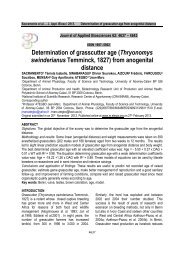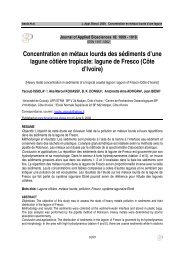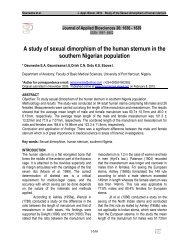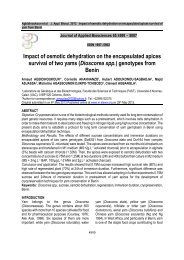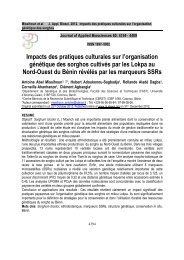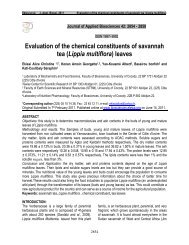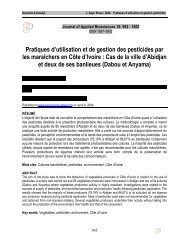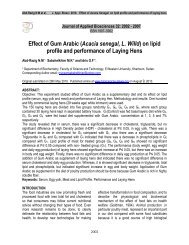Biofuels in Tanzania: Status, Opportunities and Challenges
Biofuels in Tanzania: Status, Opportunities and Challenges
Biofuels in Tanzania: Status, Opportunities and Challenges
Create successful ePaper yourself
Turn your PDF publications into a flip-book with our unique Google optimized e-Paper software.
Anthony M. Msh<strong>and</strong>ete.J. Appl. Biosci. 2011. <strong>Biofuels</strong> <strong>in</strong> <strong>Tanzania</strong>: <strong>Status</strong>, <strong>Opportunities</strong> <strong>and</strong> challengesfarmed by women, these marg<strong>in</strong>al l<strong>and</strong>s provide criticalsubsistence functions for the rural poor. It have beenrecently reported by Rossi & Lambrou (2008) ongender <strong>and</strong> equity issues <strong>in</strong> liquid biofuels that theconversion of marg<strong>in</strong>al l<strong>and</strong>s to plantations for biofuelsproduction “might cause the partial or totaldisplacement of women’s agricultural activities towards<strong>in</strong>creas<strong>in</strong>gly marg<strong>in</strong>al l<strong>and</strong>s,” with a negative impact onthe employment <strong>and</strong> <strong>in</strong>come earn<strong>in</strong>g/generation. This islikely to happen due to the fact that the presentemployment status of women <strong>in</strong> <strong>Tanzania</strong> is deplorable<strong>and</strong> the gender bias is a prevalent <strong>and</strong> significantproblem, with women work<strong>in</strong>g twice or triple work days<strong>in</strong> the fields than men (Migiro, 2004). On the otherh<strong>and</strong> if women get employment <strong>in</strong> biofuel plantations,experiences elsewhere revealed that women tend to bedisadvantaged compared to men, concern<strong>in</strong>gemployment conditions, <strong>and</strong> there is evidence thatwomen receive less tra<strong>in</strong><strong>in</strong>g <strong>and</strong> <strong>in</strong>struction than men(AWID, 2008; Rossi & Lambrou, 2008). A recent reportnoted an example from Malaysia where womenrepresent about half the plantation workforce <strong>and</strong> arepredom<strong>in</strong>antly employed as sprayers of chemicalpesticides <strong>and</strong> herbicides. Without proper tra<strong>in</strong><strong>in</strong>g <strong>and</strong>safety equipment, this can result <strong>in</strong> “seriousimplications for the long-term health of these womenworkers” (AWID, 2008; Rossi & Lambrou, 2008).Additionally, it is also well documented that large-scalemono crop plantations require mostly seasonalworkforce with work<strong>in</strong>g conditions mostly deplorable,labor rights non-existent <strong>and</strong> low payment (ChristianAid, 2009). Already there are concerns of low dailywages payment <strong>in</strong> Jatropha plantation scheme havebeen reported <strong>in</strong> <strong>Tanzania</strong> (Redfern, 2008).Nevertheless, research <strong>in</strong> <strong>Tanzania</strong> suggest thatJatropha plantation could provide significant source ofemployment (5 employments per 1ha of Jatropha)s<strong>in</strong>ce mechanized harvest<strong>in</strong>g of fruits is <strong>in</strong>efficientbecause fruit do not ripen at the same time <strong>and</strong> hencehave to picked <strong>in</strong>dividually (HakiKazi Catalyst, 2008).On the other h<strong>and</strong> pilot <strong>and</strong> experimental projects,ma<strong>in</strong>ly by NGOs such as KAKUTE, TaTEDO <strong>and</strong>companies such as Diligent found <strong>in</strong> <strong>Tanzania</strong> showspotential to <strong>in</strong>crease access to energy access for thepoor, <strong>and</strong> even provide sources of <strong>in</strong>come/employmentfor rural households, especially women. For marg<strong>in</strong>alwomen farmers <strong>in</strong> <strong>Tanzania</strong> such <strong>in</strong>come/employmentopportunities may still be perceived as relativelyattractive. However, <strong>in</strong> <strong>Tanzania</strong> biofuel developmentpolicies should also be consistent with (<strong>and</strong>, possibly,contribute to) the promotion of gender equality <strong>and</strong> theempowerment of women. In this regard measuresshould be taken to ensure that women <strong>and</strong> femaleheadedhouseholds have the same opportunity as men<strong>and</strong> male-headed households to engage <strong>in</strong> <strong>and</strong> benefitfrom the susta<strong>in</strong>able production of liquid biofuels. Thisis important <strong>in</strong> light of the <strong>in</strong>creas<strong>in</strong>g fem<strong>in</strong>ization of theagricultural workforce <strong>and</strong> the grow<strong>in</strong>g number ofhouseholds headed by females (42% of the total <strong>in</strong>Southern Africa), particularly <strong>in</strong> the poorer <strong>and</strong> morefood <strong>in</strong>secure countries of the world (Deutsch et al.,2001) often due to male out-migration or loss of malelabor force due to HIV/AIDS (FAO, 2004). Thereforeensur<strong>in</strong>g women have <strong>in</strong>creased access to <strong>and</strong> controlover l<strong>and</strong> <strong>and</strong> other productive assets would improvewomen’s welfare <strong>and</strong> they’re barga<strong>in</strong><strong>in</strong>g power with<strong>in</strong>the household <strong>and</strong> would also improve <strong>in</strong>creaseagricultural productivity.Power <strong>and</strong> politics on biofuels: Biofuel politicsrelates to the scenario of who has the power to makedecisions on issues perta<strong>in</strong><strong>in</strong>g to biofueldevelopment/<strong>in</strong>dustry. The politics of biofuels are morecomplicated than superficially seen. The stimulation ofbiofuel production/<strong>in</strong>dustry by governments of the worldis purely a political decision of bureaucrats <strong>and</strong>politicians. The political decisions, <strong>in</strong>fluence biofuel<strong>in</strong>dustry development <strong>in</strong> several ways such as <strong>in</strong> termsof subsidies on the growth of biofuel crops, productionprocesses <strong>and</strong> the prices at the pump as well as <strong>in</strong>terms of regulatory frameworks/guidel<strong>in</strong>es/policies.Elim<strong>in</strong>ation governments could impose barriers success<strong>and</strong> other necessary <strong>in</strong>terventions <strong>in</strong> favor of the<strong>in</strong>dustry such as tax <strong>in</strong>centives.<strong>Biofuels</strong> production <strong>in</strong> itself is not bad, it is the way it iscurrently be<strong>in</strong>g done that can be so problematic <strong>and</strong>/orraise concerns by stakeholders. In <strong>Tanzania</strong> already,over 40 companies/projects have biofuel projects atdifferent parts of the country predom<strong>in</strong>antly along thecoast ma<strong>in</strong>ly with Jatropha, sugarcane, sweet sorghum<strong>and</strong> palm oil as energy crops. Despite this number ofbiofuel <strong>in</strong>vestors/projects/<strong>in</strong>itiatives <strong>Tanzania</strong>’s biofueldevelopment particularly liquid biofuels (ethanol <strong>and</strong>biodiesel) are new <strong>and</strong> is still at <strong>in</strong>fancy as well as notfully understood. There have been evidences of currentbiofuels production displac<strong>in</strong>g local small farmerscreat<strong>in</strong>g social-economic issues <strong>in</strong> <strong>Tanzania</strong> (Sulle,2009b). It is however also evident that <strong>in</strong> <strong>Tanzania</strong>biofuel production for local energy consumption isunderm<strong>in</strong>ed by the obvious <strong>in</strong>tent of mult<strong>in</strong>ationals<strong>in</strong>ternational <strong>in</strong>vestors to target foreign markets. Also,there are no plans <strong>and</strong>/or scant plans to <strong>in</strong>vest <strong>in</strong>2692



